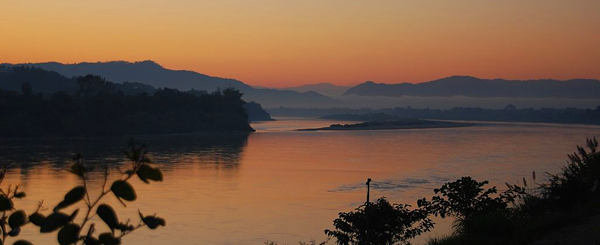Michel Jarraud, director of UN-Water, believes transboundary water cooperation is an avenue to international peace. It is a bold vision given how popular is the opposing view.
Consider the apocalyptic headlines: Clark Judge’s US News and World Report column, The Coming Water Wars, the National Public Radio story Will the Next War be Fought over Water?, and Jack Cluth’s piece in The Agonist, The Next World War Will Be Fought over Water, not Ideology or Religion
And, as we learned from the recent outbreak of hostilities between the states of Florida and Georgia (EarthDesk, August 14), the U.S. is no stranger to domestic water discord.
Mr. Jarraud believes his view is well-founded in history, however. “In a database of conflicts spanning nearly 2,000 years, there has been no recorded war that was formally triggered over water resources,” he told EarthDesk.
The Strategic Foresight Group established its Blue Peace program (EarthDesk, July 17) on the same principle with which Mr. Jarraud guides UN-Water. And he has a surprise ally in the National Intelligence Council, no Pollyanna when it comes to global conflict — as demonstrated by its grim Intelligence Community Assessment on Global Water Security.
As we reported in the June 7 EarthDesk post on transboundary waters:
On an unexpectedly optimistic note, both UN-Water and the National Intelligence Council (NIC) find hope in the mutual dependence inherent in transboundary waters. “Water can serve as a potential entry point for peace and support sustainable cooperation among nations,” according to the NIC:
The Mekong Committee, established by Cambodia, Laos, Thailand, and Vietnam in 1957 exchanged data and information on the river basin throughout the Vietnam War. Israel and Jordan held secret “picnic table” talks to manage the Jordan River starting in 1953, even though they were officially at war from 1948 until 1994. The Indus River Commission survived two major wars between India and Pakistan.

Water Security
“Water is both a matter of international development and security. The term ‘security’ is now being used as a societal concept – not necessarily in terms of sovereignty and military intervention.
‘Water security’ is a broad concept that encompasses notions of sustainable access to adequate quantities of acceptable quality water to ensure human health and well-being and sustain livelihoods and socio-economic development, as well as the protection against water-related disasters.
Water affects all sectors of the economy, especially food and energy systems. In our interlinked global economy, local water shortages can have worldwide consequences.
It is also anticipated that the lack of access to adequate water could destabilize societies that are otherwise fragile and not equipped for dealing with water-related emergencies. In other words, inadequate availability of water (quality and/or quantity) can amplify other existing societal, social and economic problems. This could lead to crises that the international community would have to deal with.
In the case of transboundary water resources, bilateral, regional and international cooperation and collaboration is essential to ensure security and integration. Many good examples exist such as the Indus Basin Treaty [1960]. Dialogue around the Indus basin has sometimes served as track-two diplomacy.
Water Conflicts
“In a database of conflicts spanning nearly 2,000 years, there has been no recorded war that was formally triggered over water resources.
In modern times, initial response from riparian countries sharing waters has always been very cautious, but becomes more positive as the benefits of cooperation become more apparent.
It is however true that significant friction exists in several basins and work is ongoing to mitigate this through cooperation. Examples include the Jordan river basin, the Aral Sea basin, the Mekong river basin, the Nile basin, the Tigris-Euphrates river basin and Brahmaputra river basin.
There are actually several good examples of transboundary cooperation and these include the Danube basin, the Rhine basin, the Indus basin, and the Mekong basin.
Access to Clean Water
“The lack of access to drinking water is a serious impediment to economic and social development. And the actual number of people that are not served with ‘safe and sustainable’ water supply is likely much larger than the reported 768 million without access to improved water supply [WHO/UNICEF Joint Monitoring Program]
This is at the origin of unacceptable poverty and death toll, and hampers international economic development and growth.
Another consideration regards health and the risks of pandemic. With current travel habits, epidemics due to inadequate water and sanitation services in a specific region could quickly spread and reach the whole world.
All countries should commit higher level of their own resources to overcome challenges related to water and sanitation because related social and economic impacts know no borders. That is why, for example, the World Economic Forum has recently ranked water supply crises in the top-5 list of risks based on likelihood and impact.
Water as a Human Right
“The declaration of water as a human right [UN Resolution 64/292] doesn’t change the ground realities such as shortage of water, lack of capacity, paucity of funds or water pollution. It can however provide an additional tool to foster dialogue and cooperation and to sensitize to the importance of the issue.
It can also be a strong motivation for action. For example, in transboundary river basins, one could use the human right as an entry point for ‘equalizing’ the situation for people living in all parts of the shared resource.”
For more on UN-Water: http://www.unwater.org/index.html
For more on Michel Jarrard: http://www.unwater.org/faces.html










